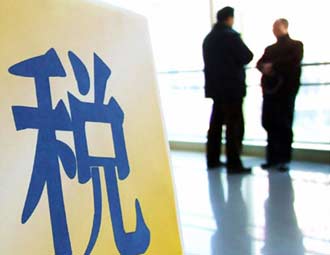
Chinese Premier Wen Jiabao said Monday that the timing and conditions are now
ripe for unifying the enterprise income tax rates for domestic and
overseas-funded enterprises to "level the playing field."
Wen made the remark while delivering a government work report to the
just-opened parliamentary annual session, which will deliberate the draft law on
equalizing corporate income tax for both domestic and foreign companies.
The unified income tax rate will help foster a fairer, more regulated and
transparent taxation system for all kinds of businesses, and help improve the
quality and standard of China's utilization of foreign investment, Jiang Enzhu,
spokesman for the annual session of National People's Congress (NPC), the
national parliament, said Sunday.
"The law still in draft will neither cause massive influence on foreign
companies or affect their enthusiasm of investing in China, " Jiang said.
The bill suggests unified income tax rates for domestic and foreign companies
at 25 percent, according to earlier reports.
The lawmaking process, initiated last December, aims to ease years of
criticism that the original dual income-tax structure is unfair to domestic
enterprises.
The income tax rate for Chinese companies is currently set at 33 percent,
while their foreign counterparts, which benefit from tax waivers and incentives,
pay an average of 15 percent. However, both actually pay less due to other
flexible preferential policies.
Many people believe that such a policy handicaps domestic businesses which
have to face tougher competition since China's accession to the World Trade
Organization (WTO) in 2001.
The reform on corporate income tax marks the maturity of China' s socialist
market economy, said Shi Yaobin, director of the taxation policy department
under the Ministry of Finance.
"It does not intend to put restrictions on foreign companies nor to
counteract their too small tax contributions before. The purpose is to create a
fair environment for competition," Shi said.
Experts agree that the tax change is actually a commitment to the WTO for
equal treatment to enterprises, which can only strengthen China's responsible
role and make it more attractive to foreign investment.
Joseph Lee, a tax and business advisory partner of Ernst & Young Beijing,
is sure that a ten-percent tax increase will not crush out the zest of foreign
investment.
"What weighs in their decision is China's huge market potential. The appeals
are not only confined to preferential tax policies," said Lee, who has provided
20 years of consulting service on taxes for multinationals.
Carlson Wagonlit Travel (CWT), the second largest travel management company
in the world, has just declared an ambitious plan of expanding business in
China. The past five years has witnessed its sales volume up by an annual rate
of 34 percent, higher than its branches in other places.
"Tax rate does not top our concerns," said CWT President Hubert Joly, adding
that what he cares most is how to raise the ratio of Chinese companies among
customers from the current two percent.
A research report from the World Bank analyzed that stable political
situation, sound economic development, broad market, rich labor sources as well
as increasingly upgraded business infrastructure and government service in China
are the major factors attracting foreign investment.
Tax incentives are usually considered less important than transparent
taxation and indiscriminate government policies, said the report.
Meanwhile, the Ministry of Finance has promised it would allow a transitional
period to offset the impact on foreign companies.
"The income tax rate will be gradually increased to the 25 percent during
that period, and foreign enterprises can still enjoy tax breaks within a
regulated time limit," said Shi Yaobin.
The current practice is new foreign investors can be exempted from income tax
for two years and get a 50 percent cut for another three years.
Generous tax incentives have fueled foreign capital influx. China has been
one of the world's top destinations for foreign direct investment, taking in
53.5 billion dollars in 2003, 60.6 billion dollars in 2004, and 60.3 billion
dollars in 2006 in terms of the amount actually used.
Last year, China reported a record tax revenue of 3.76 trillion yuan (482
billion U.S. dollars), excluding tariffs, tax on farmland acquisition and tax on
real estate contracts. Foreign- funded companies contributed 153.4 billion yuan
(19.7 billion dollars), or four percent of the total.
Experts point out that the 25-percent tax rate is still favorable compared
with those in some countries and regions. What' s more, they expect the unified
corporate income tax exert deeper influence on the country's economic growth
patterns.
Preferential tax policies will be shifted to investment in projects
concerning environmental protection, water conservation, production safety and
high-tech development, according to the draft law.
It will also spur local authorities, which often offer various tax incentives
to lure investors for usually a reckless GDP growth, to head toward a scientific
development mode, experts say.
Some multinationals have adapted their business plans to the policy change.
GE (General Electric) China has announced it will invest 50 million U.S. dollars
in its Shanghai-based technology center for products serving environmental
protection, including more efficient airplane engines and wind power generators,
seawater desalination technology, and energy-saving bulbs.
Steve Bertamini, chairman and CEO of GE North East Asia, packed the new
series of products into the idea of "eco-imagination", saying the "green"
business will become China's most booming industry in the future.
